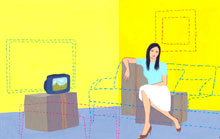Overcoming Decorating Paralysis

Illustration: Digital Vision/Thinkstock
Your dream home will never materialize if your design schemes remain imaginary. Get going with this four-point, stop-putting-it-off plan.
Here's how you know you've got a problem: Months, maybe even years, after moving into your home, you still have to talk people through it. Sure, in your mind things may be nicely arranged, but that ideal bears little resemblance to three-dimensional reality. So you say things like this:- To the pizza delivery guy: "Sorry you have to step over the bicycles; they're only there until I get this stuff organized..."
- To your in-laws: "This'll look a lot better with hardwood floors, of course. And we want to knock out a wall."
- To a friend: "I wish that chair were more comfortable. It's just a placeholder until I get some pieces I really like."
Such comments are fine if you've recently sent out change-of-address cards, but some people spend their whole lives substituting apologies and descriptions for window treatments and furniture placement. It's not that they don't have great ideas; it's that acting on them is another story. If any of this sounds familiar—if you're still narrating the home of your dreams, instead of living in it—you might need a little push to get started.
First, let's figure out why taking your living room from the theoretical to the actual seems so daunting. The cause of almost all decorating paralysis can be summed up in one little word: fear. Of course, that breaks down into a host of different subspecies: the fear of doing something wrong, the fear of displaying poor taste, the fear of spending too much money, the fear that your floor will collapse under the weight of new furniture and swallow you like a bug in a Venus flytrap.
In the end, though, fear is just one more excuse to not begin. If you get cold feet when you try to start a home-improvement project, you could take the issue to a therapist and "work through it." But that'll take time—a lot of time—which is exactly the problem. I prefer quick-and-dirty approaches that allow me and my clients to overcome fear without having to dissect our various personality complexes and mental disorders. I refer, of course, to horse tranquilizers.
I wish.
Seriously, although I don't object to chemical assistance, I myself am a fake doctor (the kind with a PhD instead of an MD), so I can only prescribe behavioral strategies to break through beginners' qualms. A few of my favorites follow.



